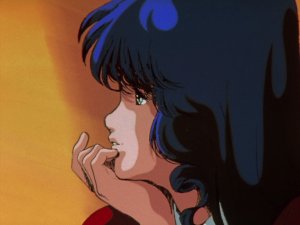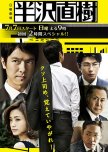Based on a pair of popular novels from award-winning author Jun Ikeido (notably a former bank employee himself), Hanzawa Naoki has enjoyed monumental success. Ratings opened through the roof in Japan and, continuing to rise every week, eventually stood at a dazzling 42% on the finale. Even more impressive is how the Japanese have embraced this drama and its titular character, almost to the point of pop culture status. When people start naming limited edition breads after something, you know it has to be special.
Hanzawa Naoki treads the waters of Japanese financial culture, following a brilliant man who dove in after experiencing its volatility firsthand. The main body of the tale begins once this man, Hanzawa, has established himself at the management level of a certain bank. We follow him through two intense loan crises, each taking five of the total ten episodes. While the first, occurring in Osaka, is truly excellent, this drama shines most brightly in the second (Tokyo). Everything feels tighter, more intense, and more character development occurs; the first half is merely beautiful set-up in comparison. If you feel daunted by business talk, don't worry. With a clear narrative careful to explain everything, Hanzawa Naoki is very accessible. Long story short, this is an intense and unpredictable drama -- sure to get hearts pounding and fists pumping. Bring on a sequel, I say!
Sakai Masato, one of the finest actors currently working in Japan, is the real draw here. As Hanzawa himself, Sakai-san oozes nuance and dynamic characterization. How hard it must be to portray this samurai-like banker, full of ferocity and compassion at once! But he makes it look easy, with his sharp and seemingly effortless performance. Even his delivery of the now-famous catchphrase: "If you screw me, I'll screw you back. It's double the payback!" induces goosebumps.
Of the supporting cast, Takito Kenichi (troubled Kondo) and Oikawa Mitsuhiro (cheerful Tomari), are memorable as Hanzawa's old compatriots. Their chemistry with Sakai-san is really wonderful, especially during the Tokyo arc. Some intense kendo practices occur between Hanzawa and Kondo, making for telling character interaction. Also featured, veteran Kagawa Teruyuki rounds out the talent as deliciously two-faced Owada.
Sweeping, dramatic instrumentals fill every scene. They are of a cinematic quality, perfectly placed, and unique. Without realizing it, I recently found myself humming the theme song while doing laundry. Though there are no traditional vocal pieces, you won't even notice.
Hanzawa Naoki treads the waters of Japanese financial culture, following a brilliant man who dove in after experiencing its volatility firsthand. The main body of the tale begins once this man, Hanzawa, has established himself at the management level of a certain bank. We follow him through two intense loan crises, each taking five of the total ten episodes. While the first, occurring in Osaka, is truly excellent, this drama shines most brightly in the second (Tokyo). Everything feels tighter, more intense, and more character development occurs; the first half is merely beautiful set-up in comparison. If you feel daunted by business talk, don't worry. With a clear narrative careful to explain everything, Hanzawa Naoki is very accessible. Long story short, this is an intense and unpredictable drama -- sure to get hearts pounding and fists pumping. Bring on a sequel, I say!
Sakai Masato, one of the finest actors currently working in Japan, is the real draw here. As Hanzawa himself, Sakai-san oozes nuance and dynamic characterization. How hard it must be to portray this samurai-like banker, full of ferocity and compassion at once! But he makes it look easy, with his sharp and seemingly effortless performance. Even his delivery of the now-famous catchphrase: "If you screw me, I'll screw you back. It's double the payback!" induces goosebumps.
Of the supporting cast, Takito Kenichi (troubled Kondo) and Oikawa Mitsuhiro (cheerful Tomari), are memorable as Hanzawa's old compatriots. Their chemistry with Sakai-san is really wonderful, especially during the Tokyo arc. Some intense kendo practices occur between Hanzawa and Kondo, making for telling character interaction. Also featured, veteran Kagawa Teruyuki rounds out the talent as deliciously two-faced Owada.
Sweeping, dramatic instrumentals fill every scene. They are of a cinematic quality, perfectly placed, and unique. Without realizing it, I recently found myself humming the theme song while doing laundry. Though there are no traditional vocal pieces, you won't even notice.
Esta resenha foi útil para você?























